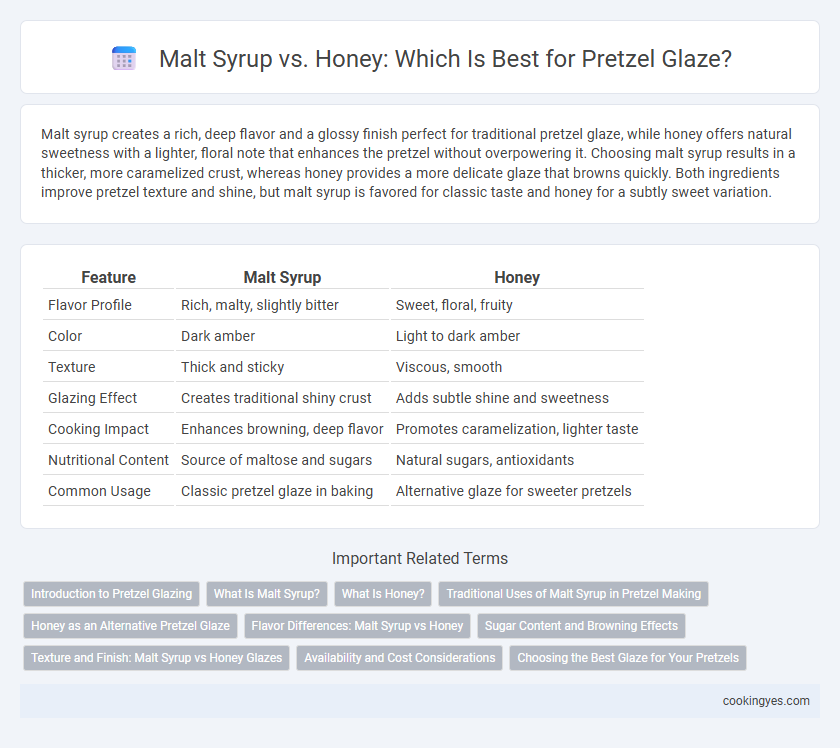Malt syrup creates a rich, deep flavor and a glossy finish perfect for traditional pretzel glaze, while honey offers natural sweetness with a lighter, floral note that enhances the pretzel without overpowering it. Choosing malt syrup results in a thicker, more caramelized crust, whereas honey provides a more delicate glaze that browns quickly. Both ingredients improve pretzel texture and shine, but malt syrup is favored for classic taste and honey for a subtly sweet variation.
Table of Comparison
| Feature | Malt Syrup | Honey |
|---|---|---|
| Flavor Profile | Rich, malty, slightly bitter | Sweet, floral, fruity |
| Color | Dark amber | Light to dark amber |
| Texture | Thick and sticky | Viscous, smooth |
| Glazing Effect | Creates traditional shiny crust | Adds subtle shine and sweetness |
| Cooking Impact | Enhances browning, deep flavor | Promotes caramelization, lighter taste |
| Nutritional Content | Source of maltose and sugars | Natural sugars, antioxidants |
| Common Usage | Classic pretzel glaze in baking | Alternative glaze for sweeter pretzels |
Introduction to Pretzel Glazing
Pretzel glazing is essential for creating the signature glossy crust and enhancing flavor through a sweet or savory coating. Malt syrup and honey are popular glaze choices, where malt syrup offers a rich, slightly malty taste with a thick consistency ideal for traditional pretzels. Honey provides a natural sweetness and a thinner glaze texture that caramelizes quickly during baking, influencing the pretzel's final color and crispness.
What Is Malt Syrup?
Malt syrup, derived from sprouted barley grains, is a thick, sweet substance commonly used in pretzel glaze to achieve a rich, characteristic color and deep, malty flavor. Unlike honey, malt syrup provides a distinctive, slightly toasted aroma and enhances the crust's chewiness, contributing to the traditional pretzel texture. Its natural enzymes also aid in browning and flavor development during baking, making it a preferred choice for authentic pretzel recipes.
What Is Honey?
Honey is a natural sweetener produced by bees from flower nectar, consisting mainly of glucose and fructose, which gives it a distinct sweetness and viscosity ideal for pretzel glaze. Its antimicrobial properties help create a glossy, slightly caramelized coating that enhances flavor and texture without overpowering the pretzel's traditional taste. Unlike malt syrup, honey offers a floral aroma and a lighter, more complex sweetness that appeals to consumers seeking natural ingredients.
Traditional Uses of Malt Syrup in Pretzel Making
Malt syrup is a traditional ingredient in pretzel making, prized for its ability to enhance the dough's texture and develop a characteristic deep brown crust through the Maillard reaction. Unlike honey, malt syrup provides a balanced sweetness with a rich, slightly nutty flavor that complements the savory profile of pretzels. Its high maltose content helps achieve the authentic chewiness and subtle sweetness associated with classic German-style pretzels.
Honey as an Alternative Pretzel Glaze
Honey serves as an excellent alternative pretzel glaze that enhances flavor with its natural sweetness and subtle floral notes, creating a distinctive golden crust. Unlike malt syrup, honey offers antimicrobial properties, which can contribute to a longer shelf life while adding a moist texture to the pretzel surface. Its viscosity enables easy application, ensuring an even coating that caramelizes beautifully during baking and imparts a rich aroma.
Flavor Differences: Malt Syrup vs Honey
Malt syrup provides a deep, robust malt flavor with subtle caramel notes that enhance the traditional savory taste of pretzels, creating a rich and authentic glaze. Honey offers a sweeter profile with floral undertones, contributing a lighter, more aromatic finish to the pretzel crust. Choosing malt syrup results in a more intense, slightly toasted flavor, while honey yields a delicate sweetness that balances the saltiness.
Sugar Content and Browning Effects
Malt syrup contains a complex mix of maltose and glucose, providing a moderate sugar content that enhances the Maillard reaction for a rich, deep brown crust on pretzels. Honey, with its higher fructose content and natural sugars, promotes quicker caramelization, resulting in a sweeter, slightly darker glaze but can cause uneven browning. Choosing malt syrup balances sugar content and browning effects, yielding traditional pretzel color and flavor without excessive sweetness.
Texture and Finish: Malt Syrup vs Honey Glazes
Malt syrup creates a traditional pretzel glaze with a deep, rich texture and a slightly caramelized finish, enhancing the exterior's chewiness and giving it a glossy sheen. Honey glaze imparts a smoother texture with a subtle sweetness and a more delicate, sticky finish that adds moisture without overpowering the dough's complexity. Malt syrup is preferred for its robust flavor and classic pretzel crunch, while honey offers a softer bite and a lighter golden color.
Availability and Cost Considerations
Malt syrup and honey differ significantly in availability and cost when used for pretzel glaze; malt syrup is widely accessible in specialty baking stores and tends to be more affordable due to its industrial production. Honey, sourced from various floral types, can vary greatly in price and availability depending on region and season, often making it a pricier choice for pretzel glazing. Bakers prioritize malt syrup for consistent supply and budget efficiency, while honey is selected for premium products where flavor complexity justifies higher expense.
Choosing the Best Glaze for Your Pretzels
Malt syrup enhances pretzel glaze with its rich, caramelized flavor and traditional amber color, creating the classic chewy crust preferred in authentic pretzels. Honey offers a sweeter, floral note and a slightly sticky texture, which can produce a softer crust and a different sheen. Choosing between malt syrup and honey depends on whether you prioritize traditional taste and texture or a sweeter, more aromatic glaze for your pretzels.
Malt Syrup vs Honey for Pretzel Glaze Infographic

 cookingyes.com
cookingyes.com